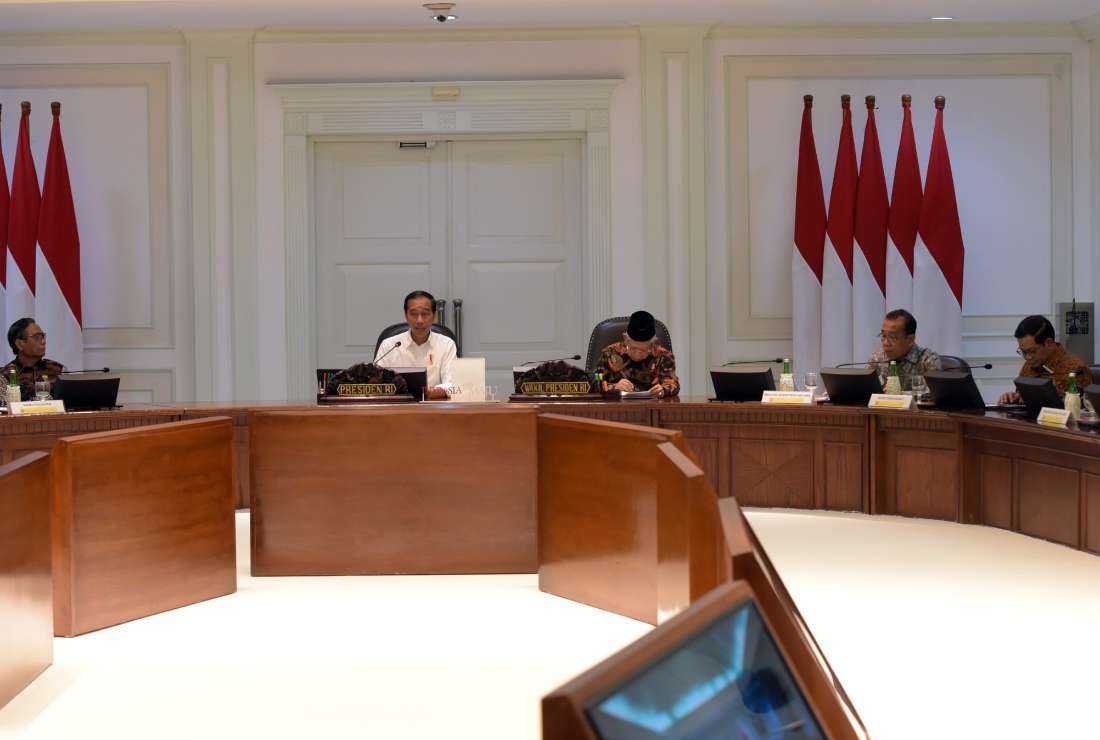
Non-judicial settlement of rights violations during 1965 purge, 1998 riot may help perpetrators go scot-free, activists fear

President Joko Widodo attends a meeting that decided on a non-judicial settlement for past gross human rights violations, in Jakarta on May 2. (Photo: cabinet secretariat)
A Catholic mother whose son was killed in an incident of gross human rights violations in Indonesia has opposed the government's reluctance to bring the perpetrators to book or apologize for the crime.
Maria Catarina Sumarsih, whose son Bernardinus Realino Norma Irmawan was shot dead by soldiers during a riot on Nov 13, 1998, following the fall of authoritarian President Suharto after a 32-year rule, said the government should comply with the provisions of the law that stresses judicial settlement.
"I do not reject reconciliation, but [it] must go through a legal process as stipulated in the 2000 law that established the Human Rights Court in Indonesia," she said on May 5.
Sumarsih told UCA News that the government should carry out the law's mandate, which says that "gross human rights violations that occurred before the law was passed must be accounted for at the ad hoc human rights court."
Sumarsih was responding to the statement by Mahfud MD, coordinating minister for politics and human rights, who said after a meeting on May 2, chaired by President Joko Widodo with 19 high-ranking officials, including commanders of armed forces and police.
"There has been no apology from the government to the public for these events, but the government acknowledges that the incidents did occur and the government regrets them," Mahfud said, referring to the purge of communist party sympathizers in 1965 in which 200,000 to 800,000 people were killed.
"Basically, confessions without being accompanied by an apology and state accountability are only superficial and cannot provide justice for victims," Fatia Maulidiyanti, coordinator of the Commission for Disappearances and Victims of Violence, said in a statement.
She said that an apology is certainly important because it is a form of symbolic reparation.
The minister said the government arrived at the conclusion following the latest order of the National Human Rights Commission which asked it to carry out a non-judicial settlement of 12 past gross human rights violation cases like the 1998 riot. Around 1,200 people were killed in the capital Jakarta alone during the riots.
Mahfud said we "will not look for the perpetrators in this non-judicial settlement" and the process will start next month.
With this non-judicial settlement, the government is perpetuating impunity, Sumarsih alleged.
"Guarantees that gross human rights violations will not be repeated in the future can only be given by trying them in court," she said.
She decried the decision of the National Human Rights Commission, which ignored recommendations of the previous panels that had asked the government to settle past human rights violation cases through judicial mechanisms.
“The accountability of perpetrators is an important part of resolving cases of gross human rights violations,” Usman Hamid, Amnesty International Indonesia’s executive director, said.
"Without these things, the impact is not only that justice for victims and their families is not fulfilled, but also does not encourage accountability and improve the system to prevent similar human rights violations in the future,” he said.
Help us keep UCA News independent
The Church in Asia needs objective and independent journalism to speak the truth about the Church and the state.
With a network of professionally qualified journalists and editors across Asia, UCA News is just about meeting that need. But professionalism does not come cheap. We depend on you, our readers, to help maintain our independence and seek that truth.
A small donation of US$2 a month would make a big difference in our quest to achieve our goal.

Share your comments